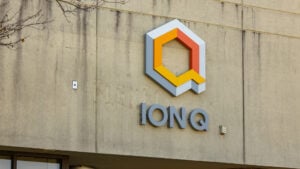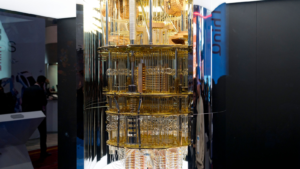Advancements in quantum computing technology such as the superconducting qubits and the trapped ion technology have boosted the efficiency and effectiveness of quantum systems. It is an interesting fact that organizations are gradually proving quantum supremacy and useful tasks for quantum computers. These are important for moving from the proof-of-concept stage to that of commercialization which can greatly increase the appeal of quantum computing stocks.
It is apparent that quantum computing is becoming more and more implemented in different fields. It is applied in financial services for portfolio management as well as identifying fraud. In the healthcare industry, quantum computing helps in drug discovery and in the development of personalized medicine. Further, fields like logistics and material science are using quantum computing for optimization issues and new material creation.
I strongly feel that given the broad application base for quantum computing, there will be some quantum computing stocks that could be multi-baggers in the making. So here are seven companies for investors to consider.
IonQ (IONQ)

IonQ (NYSE:IONQ) is a quantum computing company that is absolutely advancing in its efforts to get its technology to the market. The trapped ion qubits used in the company’s design have several benefits such as longer coherence times and the ability to easily increase the number of qubits. IonQ has already shown case use of its quantum computing potential in working with entities like DESY and Oak Ridge National Lab on problems in airport management and power grid transformation.
As of now the company is in its early commercial phase and has difficulties in generating profits and increasing its size, however, the recent achievements such as the 36-qubit system and the plans to create a 64-qubit one by 2025 are promising. Thus, IonQ has a solid cash balance and ongoing technical developments, which make it ready to meet the increasing commercial interest in quantum computing approaches.
However, given IONQ’s tiny market cap of just 1.89 billion, I think there’s the potential for it to also double or triple in value, especially as commercialization heats up.
Rigetti Computing (RGTI)

Rigetti Computing (NASDAQ:RGTI) is a company that I am confident has a massive edge in the quantum computing business. Having obtained 165 patents and cooperating with such research centers as Oak Ridge National Lab, Rigetti should be able to seize the huge long-term value of quantum computing.
Although the company is spending money to support its rapid R&D, I like the contract wins it has secured and the commencement of the sales of its 9-qubit Novera QPU. I believe that as the field of quantum computing continues to develop further, the technological advantage that Rigetti has, and the fact that it is one of the pioneers in the field will lead to increasing revenues and market share.
From a valuation standpoint, RGTI also looks attractively priced. It has a market cap of just 204.58 million and trades at only 15x sales.
D-Wave Quantum (QBTS)

I am bullish on D-Wave Quantum (NYSE:QBTS) because as far as I am concerned they are leading the race when it comes to quantum computing. D-Wave is the sole supplier of quantum annealing computers (QAs) for commercial use which gives it an edge over its competitors. Of its latest Advantage2 system, the company claims that it has more than 12,000 qubits, thus making it the “world’s largest quantum computer.”
D-Wave has solved practical problems and did that better than the current leading supercomputers. This has led to more business adoption as seen in the cases of Pattison Food Group and Ford Otosan which have incorporated D-Wave’s solutions to enhance their logistics and business operations.
For these reasons, if D-Wave’s management can execute the right strategies, I believe that the company could offer high returns to long-term investors. It also currently trades at a discount, with shares down 48.25% over the past year.
Quantum Computing (QUBT)

Being a full-stack quantum computing company, Quantum Computing (NASDAQ:QUBT) has a unique value proposition that is not present in the competitors’ strategies.
The company’s leading offering, Qatalyst, enables organizations to apply quantum methods for optimization to problems that can be solved with quantum or classical computing. QUBT’s non-hardware-oriented approach and the aim of providing quantum computing as a service definitely puts the company in a good position as the technology evolves.
New achievements like the 5-20-fold improvement in quantum computing from QAmplify, and the acquisition of the quantum photonics company QPhoton display QUBT’s innovation. Combined with the recent collaborations with such industry giants this makes QUBT one of those quantum computing stocks to buy.
QUBT also has one of the smallest market capitalizations on this list of quantum computing stocks at just 63.85 million.
Aeva Technologies (AEVA)

I like Aeva Technologies (NYSE:AEVA) because I think the company has all the right cards to play in the current trends of quantum computing and industrial robotics.
The company specializes in producing advanced sensor technologies, which is an essential component of quantum computing research and development. My view is that AEVA will grow in value as more competitors enter the market and as capital expenditure ramps up.
Furthermore, Aeva’s cooperation with Daimler Truck to apply LiDAR sensors for self-driving Class 8 trucks shows Aeva’s technological advantage and the possibilities for the company’s products to be used in the commercial vehicle sector.
AEVA is a penny stock, so it naturally has multi-bagger potential. Analysts seem to be very bullish on it nonetheless, with triple-digit revenue and EPS forecasts on the horizon for the company.
Margins for AEVA have also been improving over time, so I suspect that it has a reasonable chance of doubling in value in the foreseeable future.
Bruker Corporation (BRKR)

I feel positive about Bruker (NASDAQ:BRKR) since it is in the process of shifting from a slow-growing company to a fast-growing company in high-value analytical technologies. Namely, it specializes in scientific instruments. This means that AEVA, and BRKR supply the “picks and shovels” to allow for the quantum computing industry to grow and develop.
Bruker’s revenue in 2023 was slightly above $3 billion with above-average double-digit growth from the organic standpoint, which confirms the high market demand for Bruker’s instruments in numerous industries including life sciences, semiconductors, and energy.
One might find these companies more palatable to one’s risk tolerance if they are concerned about the high runway of quantum computing’s commercialization process. BRKR also has a diversified earnings stream from multiple clients in different industries, which could reduce risk. Although it has a 9 billion dollar market cap, it trades at just 3x sales, which means it may be potentially undervalued at its current price point and could have multi-bagger potential.
Honeywell International (HON)

I feel it’s crucial for companies to reinvent themselves in order to stay ahead of the curve. That is why I like Honeywell International (NASDAQ:HON). This company is going through a strategic shift to become one of the leading diversified industrial corporations with a focus on high-growth areas, including quantum computing.
Although HON currently has a large amount of debt on its balance sheet at $25.26 billion via the numerous acquisitions it has made over the years, I expect the company to continue to reduce its net leverage ratio over the medium to long term. The secular growth opportunities such as data center cooling, AI-driven semiconductors, and energy transition create a multiyear opportunity for the company’s revenue to grow at a faster rate and get its balance sheet back on track.
HON may also be a good pick for people who are uncomfortable putting all their eggs in one basket when it comes to quantum computing, due to the speculative and uncertain nature of the technology. But it still reserves quantum as a potentially rewarding growth tailwind, making it one of those quantum computing stocks to buy.
On the date of publication, Matthew Farley did not have (either directly or indirectly) any positions in the securities mentioned in this article. The opinions expressed are those of the writer, subject to the InvestorPlace.com Publishing Guidelines.
On the date of publication, the responsible editor did not have (either directly or indirectly) any positions in the securities mentioned in this article.
Matthew started writing coverage of the financial markets during the crypto boom of 2017 and was also a team member of several fintech startups. He then started writing about Australian and U.S. equities for various publications. His work has appeared in MarketBeat, FXStreet, Cryptoslate, Seeking Alpha, and the New Scientist magazine, among others.
